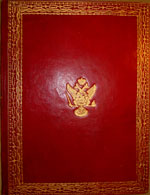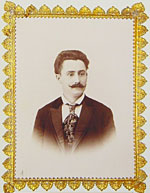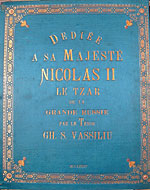Sources of Acquisisions of Music Gifts
for the National Library of Russia
A major portion of the manuscripts prtesented to Russian Emperors, had been originally collected in the Russian and Foreign Hermitage Libraries. Flyleaves of the board covers still bear bookmarks of these libraries. Some manuscripts, apparently, considered especially valuable, were "dressed up" in a so-called "court" cover of red morocco decorated with a gold-tooled border, the leaves were gilt-edged.
Between 1852 and 186, manuscripts from the Hermitage were transferred into the Imperial Public Library. Here they were divided into some groups based on the differences in their size, as well as on linguage. As a result, the musical manuscripts were distributed among several collections (the Russian books, English, Italian, German, Polish, French manuscripts, etc.). As a result, the original collection assembled in the Hermitage was split up. Music gifts to the Emperors were dispersed.
In the Russian Books Holdings, the Hermitage items are interspersed with materials from the Counts Stroganovs collection and odd music acquisitions, among which also were gifts to the Imperial family. It seems these manuscripts were not taken to the Hermitage libraries and entered the Imperial Public Library (the former name of the National Library of Russia) almost immediately after receiving by royal persons. For example, the «Concert Overture» by the French musician Louis Steingraber, marking the 25th anniversary of the wedding of Emperor Alexander II and Empress Maria Alexandrovna, which was celebrated in April 1866, came in the Public Library in the same year. The same can be said about the arrival of a number of other manuscripts in the Imperial Public Library soon after the ceremony of presentation to Emperors.
Other sources of Acquisitions of music tributes for the Imperial Public Library were the library and archives of the Court Orchestra. Evidently, the orchestra library received not all the manuscripts presented to Emperors. At first, experts made an examination of the scores, as evidenced by notes on the title pages. According to these records, the music gifts first came in the Office of the Ministry of the Imperial Court, then an opinion about the "musical merits" of works was formed, and the manuscripts were transmitted to the Court Orchestra Library or not, as a result of examination. Which means that only the works of real worth were sent there.
If the experts were not satisfied with the quality of music, but the decoration of manuscripts turned out to be very attractive, gifts were sent not to the library but to the archives. So, the Coronation March «Ural and Caucasus», written by the Royal Romanian Opera tenor Gheorg Vassiliu, carries a note, 'A pretty insignificant
In 1939, the manuscripts of the Orchestra, which was called the State Philharmonic by that time, entered the State Public Library named after Saltykov-Shchedrin (now is the National Library of Russia).



